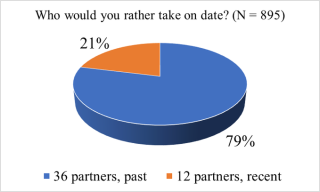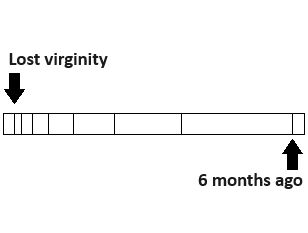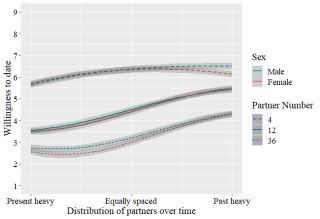Sex
Here's What Shapes the Importance of a "Body Count"
People are forgiving of an adventurous sexual history when it's ancient history.
Updated May 31, 2024 Reviewed by Tyler Woods
Key points
- Understanding when past relationships occurred dramatically reshapes perceptions of someone's sexual history.
- Many recent sexual partners is viewed more negatively due to increased risks, such as STDs and competition.
- Large numbers of past sexual partners is less off-putting when the activity happened some time ago.
- Provisional results point to consistency of time effects in 11 different countries, from the U.K. to China.
The discourse surrounding body count is often one-dimensional, focusing solely on numbers. There is another crucial, overlooked dimension that can add nuance: time.
In a previous post, I explored the idea of "body count" and why paying attention to a partner’s sexual history might have a protective function—reducing the risk of infidelity, contracting STDs, and choosing a partner who struggles to commit.
An illustrative example
You're on a third date with someone you find attractive, hoping to pursue a long-term relationship with them. Over the course of the evening, the subject of past relationships comes up. They reveal that they have had 12 sexual partners in the past. Instantly, you form an impression of them—based on this number alone. What would that impression be for you?
Later into the evening, you learn that most of those relationships happened when they were much younger—a period marked by self-discovery and exploration. Since then, they’ve had only two long-term relationships, lasting several years. How does this new information reshape your initial impression?
Notice what happens if we tweak the script: Later into the evening, you learn that most of those relationships happened within the last six months. Before that, they had only two long-term relationships, each lasting several years. What would you be thinking now?
A matter of time
Impressions can shift dramatically with the “when” and perhaps with good reason. When someone’s sexual history is skewed towards the present, risk increases accordingly. There might be high levels of competition with recent partners hanging around, STDs might be present but not yet known or (if possible) treated, and the suitor might be more interested in rebound flings than commitment—making them less in line with your goal of settling down.
These risks are alleviated when sexual history is skewed towards the past: Competitors are long gone, STD status is more likely to be known, and their interest in “keeping things casual” may have waned.
As an illustration, I recently asked almost 900 of my followers on X who they would rather take on a date: Someone with 36 past partners (Person A) or 12 past partners (Person B). The catch? The bulk of Person A’s sexual history was confined to the past, while most of Person B’s sexual history happened recently.

The results were interesting (Fig 1). People were three times more likely to pick Person A. Most people would be willing to date someone with three times as many previous sexual partners, provided those experiences were well behind them.
From illustration to scientific evidence

A poll on X is one thing. But we’ve actually been working on a series of large-scale academic research studies on this phenomenon (watch this space). From over 5,000 participants across 11 countries, we asked people to what extent they'd entertain a long-term committed relationship with someone based on their number of previous sexual partners (4, 12, or 36). Importantly, we asked them several times for each number, displaying when these happened in someone's sexual history ranging from very "present heavy" to equally spaced to "past heavy" (see Fig 2 for an example of "present heavy" with 12 partners).
As a spoiler, I can share a bottom-line result with you: Overall, past partner number matters (see Fig 3). But, as you can see, “forgiveness” effects are very real. For instance, the willingness to date someone with 12 past partners concentrated in the present is similar to the willingness to date someone with 36 partners confined to the distant past.

Interestingly, we found very little in the way of sex differences, including a lack of sexual double standards. Women weren’t judged more harshly for their sexual history than men. We did find some influence of mating strategy, however. Those with a more unrestricted sociosexuality score—people willing to engage in sexual activity outside of a committed relationship—were more willing to date those with richer sexual histories. If you’re looking for a short-term fling, a partner with an adventurous present might seem more appealing, offering easy sexual access. Conversely, if you're looking for a long-term relationship, a past full of adventures but a present marked by stability could be more attractive.
However, it is important to note that this forgiveness has its limits. Our data show curvilinear trends—beyond a certain point, no further passage of time into the past can mitigate the perceived impact of a high number of partners.
Conclusion
Understanding the historical context of past relationships offers a more comprehensive perspective on someone's sexual history. The risks associated with past sexual history are not equal across time, and this added dimension can lead to more informed, and perhaps less judgmental, perspectives on sexual history.
It ain’t what you do; it’s when you did it.
References
Thomas, A. G. et al. (2024). “It ain't what you do, it’s when you did it”: Cross-cultural evidence that number and temporal distribution of past partners impact attractiveness [Conference presentation]. 35th annual Human Behavior and Evolution Conference, Aarhus, Denmark.




